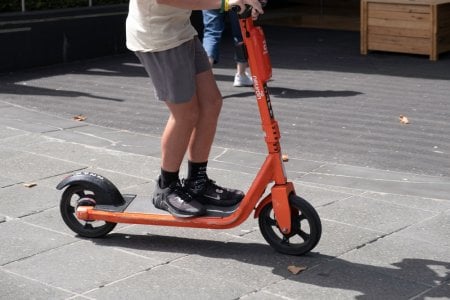Aussies can receive $3,300 fine without even being behind the wheel by doing these acts!
By
Seia Ibanez
- Replies 7
Navigating the legalities of emerging transportation technologies can be a minefield, and for those who are keen to embrace the convenience and environmental benefits of e-scooters, it's essential to stay informed to avoid hefty fines.
As the debate around the legalisation of e-scooters continues, it's clear that the rules are still catching up with the technology.
In New South Wales, the current laws surrounding e-scooters might come as a surprise to many. While you can legally purchase an e-scooter, using one on public streets or footpaths is a different story.
Unless you're riding on private property or within the confines of a trial program in select areas, you could be risking fines ranging from $344 to a staggering $3,300.

The NSW government is attempting to address this 'blind spot' in regulation with draft legislation that proposes legalising e-scooter use on streets and roads, mandating helmets, and prohibiting their use by individuals under 16.
Transport Minister Jo Haylen has highlighted the disconnect between the popularity of 'e-micromobility devices' and public awareness of their legal status, with only 22 per cent of riders knowing that e-scooters are illegal to ride on the street.
‘It’s a strange regulatory blind spot, and it has to change,’ she said.
Sydney lawyer Avinash Singh has echoed these concerns, noting that many residents are unaware of the legal restrictions and the potential for hefty fines.
The lack of a registration scheme for e-scooters in NSW means that riders could face multiple fines for using an unregistered or uninsured e-scooter ($686 fine), not wearing an approved helmet ($344 fine), driving unlicensed ($572 fine), or even driving while suspended or disqualified ($3,300 fine.
‘In my experience, most people are shocked to find out that e-scooters are illegal to ride in NSW. The most common complaint we hear is that there is a lack of information provided by the government about them being illegal to ride,’ he said.
‘An e-scooter cannot be registered in NSW. Because they are illegal to ride there is no scheme under which they are regulated or registered.’
The proposed changes would introduce a 20km/h speed limit for e-scooters on shared and bike paths and roads, as well as a 0.05 blood alcohol limit.
They would also be restricted to roads with a 50km/h speed limit, despite the fact that many e-scooters can reach much higher speeds.
Across NSW, the use of e-scooters and e-bikes is on the rise, with the government citing convenience for travel as a major factor.
However, the rapid increase in popularity has left councils feeling ‘blindsided’ by the prospect of legalisation and concerned about the implications for regulation and infrastructure.
Public hearings and inquiries into the matter have revealed a desire for better public transport and fewer cars and concerns about shared mobility services' impact on footpaths and parking availability.
The City of Sydney has pointed out that motor vehicles remain the major safety risk and that separated cycleways could boost active transport if supported by the state.
In other states like Queensland, WA, and ACT, e-scooters have more freedom, with speed limits set for different types of paths and roads.
Meanwhile, in Victoria and Tasmania, the rules vary, with some areas allowing e-scooter use and others imposing bans or restrictions.

Are they a convenient and eco-friendly option for getting around, or are you concerned about their safety and regulation? Share your experiences and opinions in the comments below!
As the debate around the legalisation of e-scooters continues, it's clear that the rules are still catching up with the technology.
In New South Wales, the current laws surrounding e-scooters might come as a surprise to many. While you can legally purchase an e-scooter, using one on public streets or footpaths is a different story.
Unless you're riding on private property or within the confines of a trial program in select areas, you could be risking fines ranging from $344 to a staggering $3,300.

Aussies could be slammed with up to $3,300 on some acts while using e-scooters. Credit: Shutterstock
The NSW government is attempting to address this 'blind spot' in regulation with draft legislation that proposes legalising e-scooter use on streets and roads, mandating helmets, and prohibiting their use by individuals under 16.
Transport Minister Jo Haylen has highlighted the disconnect between the popularity of 'e-micromobility devices' and public awareness of their legal status, with only 22 per cent of riders knowing that e-scooters are illegal to ride on the street.
‘It’s a strange regulatory blind spot, and it has to change,’ she said.
Sydney lawyer Avinash Singh has echoed these concerns, noting that many residents are unaware of the legal restrictions and the potential for hefty fines.
The lack of a registration scheme for e-scooters in NSW means that riders could face multiple fines for using an unregistered or uninsured e-scooter ($686 fine), not wearing an approved helmet ($344 fine), driving unlicensed ($572 fine), or even driving while suspended or disqualified ($3,300 fine.
‘In my experience, most people are shocked to find out that e-scooters are illegal to ride in NSW. The most common complaint we hear is that there is a lack of information provided by the government about them being illegal to ride,’ he said.
‘An e-scooter cannot be registered in NSW. Because they are illegal to ride there is no scheme under which they are regulated or registered.’
The proposed changes would introduce a 20km/h speed limit for e-scooters on shared and bike paths and roads, as well as a 0.05 blood alcohol limit.
They would also be restricted to roads with a 50km/h speed limit, despite the fact that many e-scooters can reach much higher speeds.
Across NSW, the use of e-scooters and e-bikes is on the rise, with the government citing convenience for travel as a major factor.
However, the rapid increase in popularity has left councils feeling ‘blindsided’ by the prospect of legalisation and concerned about the implications for regulation and infrastructure.
Public hearings and inquiries into the matter have revealed a desire for better public transport and fewer cars and concerns about shared mobility services' impact on footpaths and parking availability.
The City of Sydney has pointed out that motor vehicles remain the major safety risk and that separated cycleways could boost active transport if supported by the state.
In other states like Queensland, WA, and ACT, e-scooters have more freedom, with speed limits set for different types of paths and roads.
Meanwhile, in Victoria and Tasmania, the rules vary, with some areas allowing e-scooter use and others imposing bans or restrictions.
Key Takeaways
- NSW is deliberating on legalising e-scooter use on roads and streets while clarifying existing laws and regulations.
- Users of e-scooters in NSW could face fines between $344 and $3,300 for improper use, such as riding on public roads or not wearing a helmet.
- The proposed legislation would enforce helmet use, set a 20km/h speed limit on shared and bike paths and roads, and prohibit e-scooter use for people under 16.
- Despite the debate, many Australians consider e-scooters a convenient transportation alternative, but concerns about safety and regulation persist across different states.







